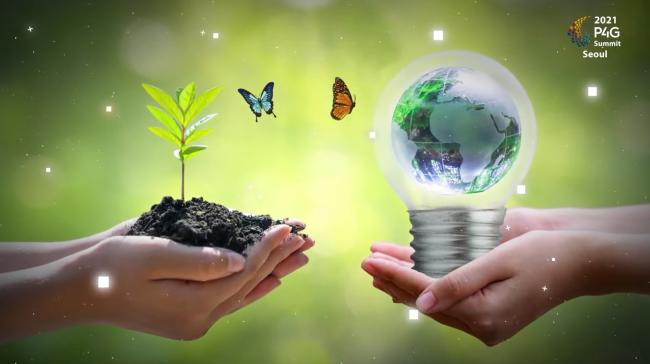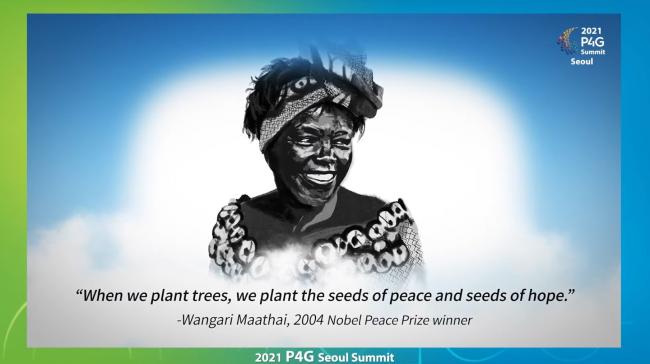On day 5 of Green Future Week, speakers and participants discussed advances in green technology to achieve climate neutrality, hosted by the Republic of Korea’s Ministry of Science and Information and Communications Technology (ICT). Next, a Korea Forest Service (KFS)-hosted event considered the role of forests in achieving net zero greenhouse gas emissions by 2050 at the latest.
Green Technology: Path Finder for Carbon-Neutral Society
Lim Hye-sook, Minister of Science and ICT, affirmed the Republic of Korea’s commitment to creating an enabling ecosystem for innovation and highlighted several commitments, including its Act on the Promotion of Climate Change Response Technology Development. Business leaders then presented actions of their respective companies toward achieving the climate neutrality goal.
Several companies, including LG Chemicals and Volvo Construction Equipment, highlighted their testing of green hydrogen fuels. Participants discussed what would be needed to scale up the use of such ‘frontier’ technologies. Tim Brook, The LEGO Group, described taking steps to make its iconic plastic bricks with bio-materials and recycled content, as well as collecting, cleaning and donating used bricks so they can still remain in play.
On partnerships for global carbon neutrality, Inger Andersen, Executive Director, UN Environment Program (UNEP) pointed to technologies for energy efficiency, efficient cooling, and methane reduction. She said in order for technologies to be useful, they must be relevant, customizable, affordable, and available.
Måns Nilsson, Executive Director, Stockholm Environment Institute (SEI), noted the need for policies and institutions to address the “valley of death” between the emergence of new technologies and their large-scale deployment. He mentioned, as examples, the Leadership Group for Industry Transition (LeadIT), a partnership of countries and companies for creating green value chains and products, and the Swedish and Korean Green Transition Alliance, which aims to reduce the environmental and carbon footprint of Swedish companies in the Republic of Korea.
Forests for Global Net-Zero and Peace
Byung-am Choi, KFS Minister, with other speakers, emphasized the value of forests, warning that deforestation and land degradation has a large impact on carbon emissions, even more so than entire world’s transportation. Speakers presented projects for agroforestry and reforestation. Many referred to the UN Decade of Ecosystem Restoration 2021-30, the World Economic Forum’s One Trillion Trees initiative, and other opportunities for action.
Ibrahim Thiaw, Executive Secretary, UN Convention to Combat Desertification (UNCCD), highlighted the Peace Forest Initiative launched during the 14th meeting of the Convention of the Parties to the UNCCD (COP 14) in 2019 in New Delhi, India, to achieve land degradation neutrality, and contribute to collective security and stability in post-conflict areas. Minister Choi presented a P4G partnership on agro-forestry and shade-grown coffee in Ethiopia as an example of a viable project for roll-out in other countries.
Milagros De Camps, Ministry of Environment and Natural Resources, Dominican Republic, presented on cooperation between the Dominican Republic and Haiti on climate-smart agriculture, sustainable tourism, restoring critical areas for biodiversity, and building greater awareness of soil degradation. She noted that the two countries share a common island, which makes them natural allies.
The session concluded with participants looking forward to the Republic of Korea hosting of the World Forestry Congress by the Republic of Korea in Seoul in May 2022.
To receive continuing coverage of this event delivered to your inbox, subscribe to the ENB Update newsletter.












